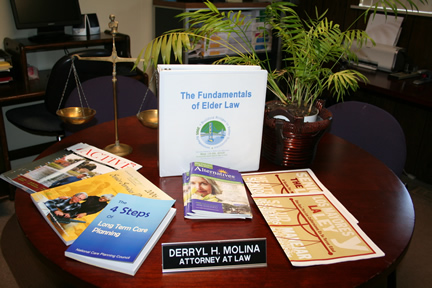

ELDER LAW
Home Estate Planning Trusts Wills Elder Law Wealth Management Mediation Probate
WHAT DOES AN ELDER LAW ATTORNEY DO?
STATISTICS ON LONG TERM CARE
1 in 2 American households are involved in some kind of care-giving.
78% of long-term care is provided at home or in the community. At home no cost if done by family or friends.
1 in 7 Americans receive Medicaid.
1 in 4 of Medicaid recipients receive Long Term Care services.
70% Medicaid costs come from the Federal Govt. 30% comes from states.
75% of assisted living costs is paid by residents and their families.
Adult day care cost is borne by the family or subsidized by private, state and county welfare programs.
Hospice is almost always paid by the government.
Average paid Medicare nursing home stay is 23 (out of 100 allowable) days.
1998 -- Congress mandated state recovery service agencies, targeting primarily elderly long-term care beneficiaries.
How to Tell When a Senior Citizen Needs Help
If a senior
citizen has a major disability or requires additional help following a hospital
stay, it is easy to recognize that home help care is needed. But, in other circumstances, it
may not be immediately obvious that your family member is in need of
care.
Here is a guideline to determine your loved one's current abilities. If the
answers to all of these questions is yes, the senior citizen is in urgent need
of additional care or assistance. If the answers to many of the questions
are
yes, you should immediately explore what type of home care is needed and get
the assistance started. If an occasional question is answered in the
affirmative, you should determine the cause and attempt to solve the problem,
being aware that it may be the first step toward a need for in-home health
care..
I. Pay
Attention to How They Look
Are
they wearing dirty or stained clothing?
Have they brushed their teeth regularly?
Is their hair combed?
Do they appear to have lost weight without trying?
II. Listen
to the Senior to determine current mental status.
Are they aware of and conversant about current events?
Do they talk about future plans or goals?
Have they forgotten to refill prescriptions or take their medicine?
Have they missed doctor's appointments?
III. View the Senior's Surroundings
Is there an unusual amount of garbage, clutter, dust, or dirt?
Do they have fresh and stocked pantry items?
Do they cook their own meals?
Are the home-cooked meals well-balanced and nutritious?
Are there piles of unopened bills or other mail?
Are there always unmade beds, dirty floors, dirty toilets or dirty bathtubs?
IV. : Use Your Nose as an indicator
Does their living
environment possess any unpleasant odors?
Does the refrigerator or cupboard smell?
Are they bathing and washing their hair regularly?
Do they have expired or rotten food in the refrigerator?
If In-Home Supportive Care is needed, check out the local options and determine
which service is best for you and your needy senior.
V.
In-Home Supportive Care Options
Many organizations offer in-home supportive care and personal care assistance to seniors and disabled adults who want to continue to live independently. Some of the local options are:
Liv-Home, (408) 898-1835 or www.livhome.com. Mickey Goldkorn of LivHOME, Inc. says that Liv HOME is committed working with you to improve the quality of life of seniors and their families. Their tag line is When only the best will do, call LivHOME.
AristoCare of Santa Clara, (408) 287-2273 or www.aristocare.net. AristoCare uses a hands-on personal approach to every case to develop long-term and caring relationships with their clients. Their tag line is <Putting the Heart Back into Home Health Care.
Right at Home at
www.rightathome.net or the Santa Clara County office at
www.Rightathome.Net/Santaclaracounty. Families need guidance, and should
follow a careful assessment of their senior's needs in making a decision about
whether to provide extra care and assistance, said Gene Lennon of the Santa
Clara County Right at Home office.
VI. A Word of Warning
Be wary of inexpensive health care providers you find advertising in the newspaper or the Pennysaver. In many cases, they have no training as caregivers. Many of them are professional elder abusers. You get what you pay for. If you opt for cheap, the quality of service will be minimal and the consequences can be huge. Whoever you select, check their references thoroughly, go out and observe them at work, and make sure you have a written contract that protects you and your loved one.
The information on this website is for educational purposes only and should not be considered legal advice or an attorney-client relationship. For clarification of any material of this website or to seek help on your particular issue, feel free to contact The Law Office of Derryl H. Molina at (408) 244-4992 or email Derryl H. Molina at attderryl@comcast.net